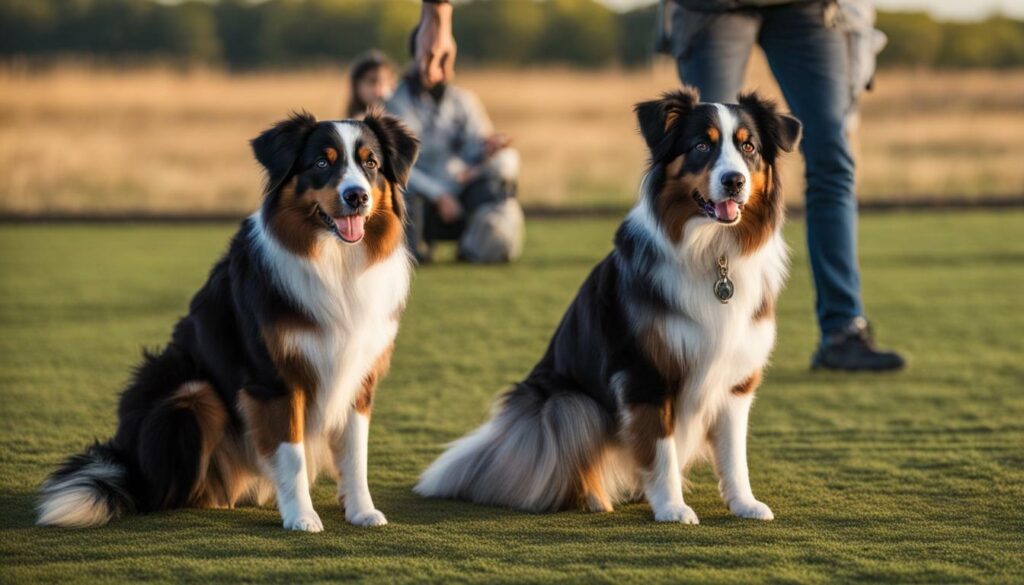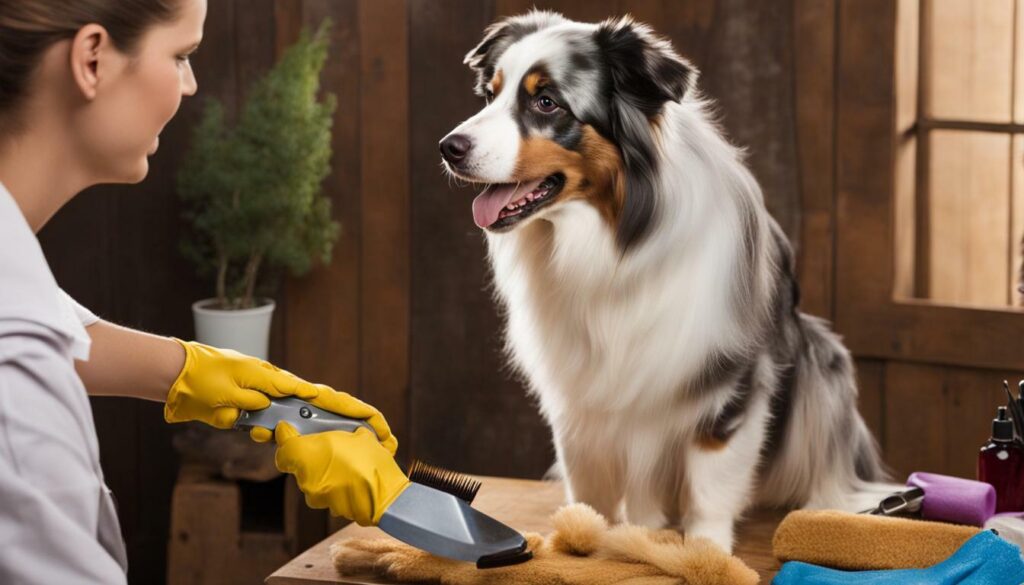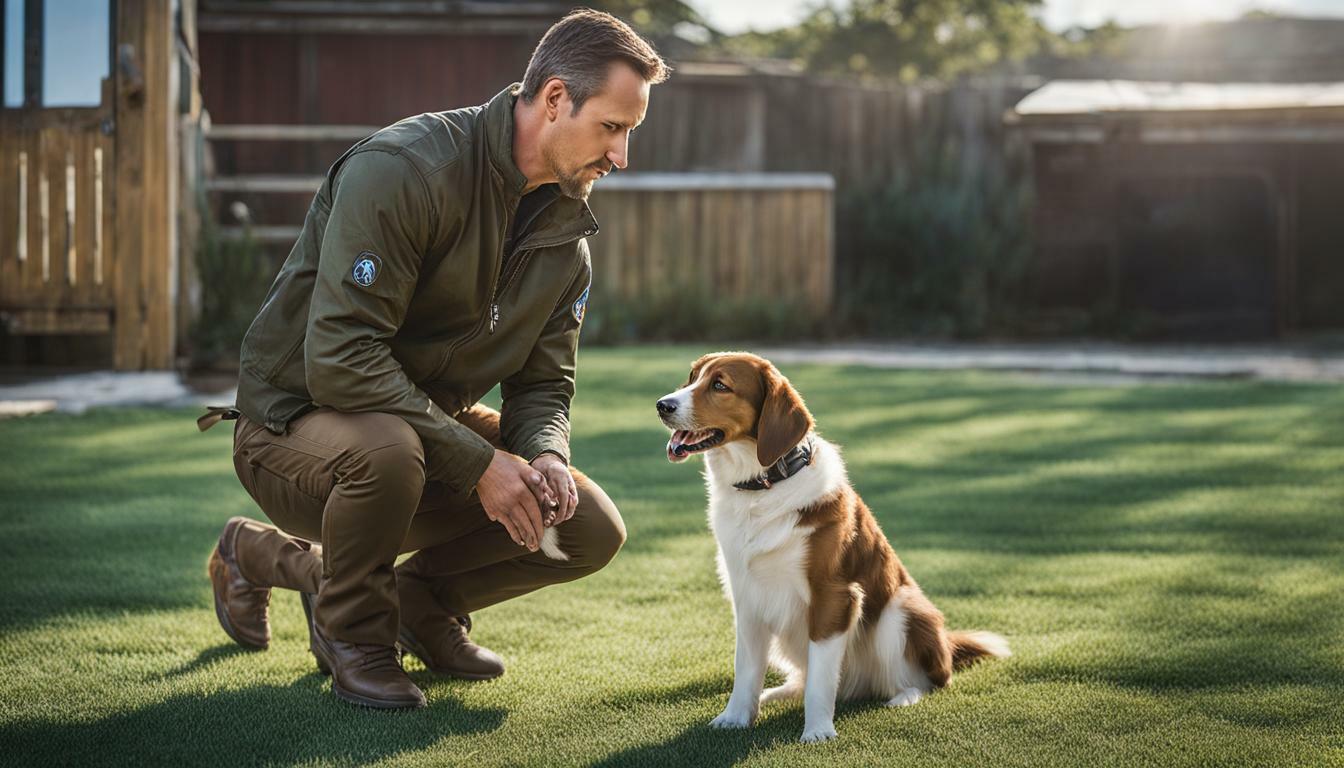If you’re considering bringing an Australian Shepherd into your home, you’re in for a treat. This energetic and loyal breed loves nothing more than being by your side and engaging in fun activities. However, owning an Australian Shepherd also comes with responsibilities.
In this comprehensive guide, we’ll provide you with all the information you need to become a confident and knowledgeable owner. From understanding their breed characteristics to providing proper care, training, and socialization, we’ll cover it all.
- As an Australian Shepherd owner, it’s important to be prepared for their high energy levels and need for mental and physical stimulation.
- Understanding their breed characteristics, including their herding instincts, can help you provide proper training and socialization.
- Proper nutrition, grooming, and healthcare are essential for the health and well-being of your Australian Shepherd.
- Effective training techniques can help prevent common behavior challenges and create a well-behaved companion.
- Proper socialization with other animals and people is crucial for a well-rounded and friendly Australian Shepherd.
Understanding the Australian Shepherd Breed
The Australian Shepherd, commonly known as the “Aussie,” is a medium-sized dog bred for herding. Originating in the Western United States in the 19th century, they were primarily used for livestock work. Today, they are a popular family pet known for their loyalty, intelligence, and energetic nature.
One of the defining features of the Australian Shepherd is their coat. They have a thick, double coat that comes in a variety of colors, including black, blue merle, red, and red merle. Their coat requires regular grooming to stay healthy and shiny, including weekly brushing and occasional baths.
Temperament
Australian Shepherds are known for their high energy levels and need for physical activity and mental stimulation. They are intelligent dogs that thrive on learning new things and having a job to do. Without adequate exercise and mental engagement, they can become bored and destructive.
Along with their energy and intelligence, Australian Shepherds are also known for their loyalty and affection towards their owners. They can be wary of strangers and unknown animals, making them excellent watchdogs.
Activity Requirements
Due to their herding background, Australian Shepherds have a natural inclination to run, chase, and play. They require a minimum of 60 minutes of daily exercise and mental stimulation, such as agility training, obedience classes, or interactive toys. They thrive in homes with large yards or access to open spaces, where they can run and play freely.

While Australian Shepherds are generally a healthy breed, they can be prone to some health issues, including hip dysplasia, eye problems, epilepsy, and cancer. Regular veterinary check-ups, a nutritious diet, and adequate exercise can help prevent and manage these health concerns.
Overall, Australian Shepherds make excellent companions for active individuals and families. By understanding their breed characteristics and needs, you can ensure they live a long, happy, and healthy life.
Preparing for an Australian Shepherd
Before bringing your new furry friend home, it’s important to prepare for their arrival. Owning an Australian Shepherd requires careful planning and preparation.
Tips for Australian Shepherd Ownership
Here are some tips to help you prepare:
- Create a safe and welcoming environment for your Australian Shepherd. This includes providing a comfortable sleeping area, plenty of toys, and a secure yard or play area.
- Invest in high-quality dog food that meets your Australian Shepherd’s nutritional needs. Consult with your veterinarian to determine the best diet for your dog.
- Stock up on grooming supplies, including brushes, shampoo, and nail clippers. Australian Shepherds have a thick coat that requires regular grooming to stay healthy and happy.
- Find a trusted veterinarian who can provide regular check-ups and preventive healthcare for your Australian Shepherd.
- Consider enrolling in obedience training classes to help your Australian Shepherd learn basic commands, socialize with other dogs and people, and prevent behavioral issues.
By taking these steps, you can help ensure a smooth transition for both you and your new furry friend.

Australian Shepherd Training Tips
Training is an essential component of owning an Australian Shepherd. These intelligent dogs thrive when they have a job to do, and training provides mental stimulation and a sense of purpose. Effective training techniques are based on positive reinforcement, consistency, and patience.
Start training your Australian Shepherd as early as possible. Puppies have a natural desire to please their owners, and early training helps them establish good habits and behaviors that will last a lifetime. Basic obedience commands, such as “sit,” “stay,” and “come,” should be introduced first.
As your Australian Shepherd progresses in training, you can move on to more advanced skills, such as agility training and herding trials. Keep in mind that Australian Shepherds have a strong herding instinct, and training can help channel this behavior in a positive way.
Australian Shepherd Training Techniques
Positive reinforcement is the most effective training technique for Australian Shepherds. This means rewarding good behavior with treats, praise, and playtime. Avoid punishment-based training, as this can lead to fear and anxiety.
Consistency is another essential component of effective training. Use the same commands and reward system every time you train your dog. This helps your Australian Shepherd understand what is expected of them and encourages good behavior.
Patience is also critical when training an Australian Shepherd. These dogs are intelligent and eager to learn, but they can also be stubborn at times. Stay calm and positive, and avoid getting frustrated or angry.
Addressing Behavioral Issues
If your Australian Shepherd displays any behavioral issues, such as excessive barking, digging, or chewing, it’s important to address them immediately. These behaviors can be a sign of boredom or anxiety, and training can help redirect their energy in a positive way.
It can also be helpful to provide your Australian Shepherd with plenty of exercise and mental stimulation. These dogs require regular physical activity, and mental stimulation through training, puzzle toys, and interactive games can help prevent destructive behaviors.

In conclusion, effective training is essential for a well-behaved Australian Shepherd. Consistency, positive reinforcement, and patience are key, as is addressing any behavioral issues immediately. With proper training and plenty of exercise and stimulation, your Australian Shepherd can become a well-mannered and beloved member of your family.
Feeding Your Australian Shepherd
Your Australian Shepherd’s diet has a significant impact on their health and well-being. Proper nutrition is essential to ensure they maintain a healthy weight, strong bones, and a shiny coat.

When choosing your dog’s food, consider their age, weight, activity level, and any health concerns. Australian Shepherds are energetic dogs that require a diet rich in protein and fat. However, they are also prone to weight gain, so it’s important to monitor their calorie intake and provide them with regular exercise.
You should feed your Australian Shepherd twice a day, split into equal portions. Avoid leaving food out for extended periods, as this promotes overeating and weight gain. Instead, pick up any uneaten food after 30 minutes and adjust portion sizes accordingly.
In addition to their main meals, you can give your Australian Shepherd treats as a reward for good behavior or as a snack. However, make sure to choose healthy treats that are low in calories and avoid overfeeding.
Proper hydration is also crucial; ensure your dog always has access to fresh, clean water.
Consult with your veterinarian to determine the best diet and feeding schedule for your Australian Shepherd.
Australian Shepherd Care Guide
Proper care is essential for your Australian Shepherd’s health and happiness. In this section, we’ll cover the basics of how to care for your furry friend.
Exercise
Australian Shepherds are high-energy dogs that require daily exercise to keep them healthy and happy. They love to play and run, so make sure they have plenty of space to do so. A long walk or run each day is ideal, but they will also enjoy playing fetch or participating in agility training. Be sure to provide your Australian Shepherd with enough exercise to keep them physically and mentally stimulated.
Mental Stimulation
Australian Shepherds are intelligent dogs that need mental stimulation to prevent boredom and destructive behavior. Engage their mind by providing puzzle toys and interactive games that challenge their problem-solving skills. Training sessions are also an excellent way to keep their minds sharp and to bond with your furry friend.
Grooming
Australian Shepherds have a thick double coat that sheds year-round. Regular grooming is essential to prevent matting and to keep their coat healthy and shiny. Brush their coat at least once a week and bathe them every two to three months. Keep their nails trimmed and their ears clean and dry to prevent infections.

Preventive Healthcare
Regular visits to the veterinarian are essential to keep your Australian Shepherd healthy. They require vaccinations, flea and tick prevention, and regular check-ups to monitor their overall health. Schedule dental cleanings as recommended by your vet to keep their teeth and gums healthy.
Nutrition
Australian Shepherds require a healthy and balanced diet to maintain their energy and overall health. Feed them a high-quality dog food that is appropriate for their age, size, and activity level. Avoid feeding them table scraps or human food as it can upset their stomach and lead to nutritional deficiencies.
Conclusion
By providing proper care and attention, you can ensure your Australian Shepherd lives a happy and healthy life. Remember to exercise them regularly, keep them mentally stimulated, groom them, provide preventive healthcare, and feed them a healthy diet. With your love and care, your furry friend will be a happy and loyal companion.
Australian Shepherd Health Tips
Keeping your Australian Shepherd healthy is a top priority for any loving owner. Here are some tips to help you maintain your dog’s well-being:
Diet and Nutrition
Proper nutrition is essential to keep your Australian Shepherd healthy and energetic. Choose a high-quality dog food that is appropriate for their age, weight, and activity level. It’s also essential to provide clean drinking water at all times. Talk to your veterinarian to develop an appropriate feeding schedule and diet plan to ensure your dog receives all the necessary nutrients.
Exercise
Australian Shepherds are known for their energy and need for daily exercise. Regular exercise helps maintain their physical health and mental well-being. Take your dog for daily walks, runs, or hikes to keep them active. You can also engage in activities such as fetch or agility training to keep your dog’s mind stimulated.
Preventive Healthcare
Regular trips to the veterinarian can help detect any health issues early and prevent serious illnesses from developing. Keep up with your dog’s vaccinations, deworming, and flea and tick prevention. Schedule an annual check-up with your vet to ensure your dog is healthy and receives any necessary treatments.
Grooming
Australian Shepherds have a beautiful coat that requires regular grooming. Brush your dog’s coat at least once a week to remove any loose fur and prevent matting. Bathe your dog as needed, and clean their ears and trim their nails regularly. Regular grooming helps maintain your dog’s physical appearance and prevents skin issues.
Signs of Illness
It’s important to monitor your Australian Shepherd for any signs of illness. Common health issues for this breed include hip dysplasia, epilepsy, and eye problems. Watch for symptoms such as lethargy, loss of appetite, vomiting, diarrhea, or difficulty breathing. If you notice any of these symptoms, contact your veterinarian immediately.

By following these tips, you can ensure your Australian Shepherd lives a healthy, happy life. Remember to provide them with regular exercise, proper nutrition, preventive healthcare, and grooming. By doing so, you’ll have a loyal and loving companion by your side for years to come.
Australian Shepherd Grooming Guide
Grooming is an essential aspect of Australian Shepherd care. Regular grooming not only keeps your dog looking well-maintained but also helps maintain their overall well-being. Here’s what you need to know about grooming your Australian Shepherd:
Brushing
Australian Shepherds have a thick, double-layered coat that sheds seasonally. Regular brushing not only helps control shedding but also distributes natural oils throughout their coat. Use a slicker brush to remove tangles, mats, and loose fur. A pin brush is useful for smoothing their coat and removing the undercoat. Brush your Australian Shepherd at least once a week to keep their coat healthy.
Bathing
It’s essential to bathe your Australian Shepherd occasionally to keep their coat clean, but not too often as it can strip their coat of natural oils. Use a dog-specific shampoo that matches their coat type and lather thoroughly. Rinse thoroughly to avoid leftover soap and towel dry. Bath your Australian Shepherd no more than once every three months unless they get dirty or have skin issues.
Nail and Ear Care
Trim your Australian Shepherd’s nails every few weeks, making sure only to cut the tip to avoid nicking the quick. Overgrown nails can hurt your dog and affect their gait. Check their ears weekly for signs of infection, discharge, odor, or redness. Wipe the inside of their ear flap with a damp cloth or cotton ball to remove dirt and wax build-up. Do not insert anything inside their ear canal.
Teeth Care
Oral health is critical for your Australian Shepherd’s overall health. Brush their teeth regularly with dog-specific toothpaste and a toothbrush. Provide them with dental chews and toys to keep their teeth clean and healthy. Additionally, schedule regular dental check-ups with your veterinarian for professional cleaning and dental care.
Grooming your Australian Shepherd requires time and patience, but it is worth it to keep them healthy and looking their best. Remember to groom them regularly and seek professional help when necessary.

Australian Shepherds are known for their intelligence, high energy, and herding instincts. It’s important to understand their behavior to provide proper training and socialization to ensure they grow into well-behaved companions.
Intelligence
Australian Shepherds are highly intelligent and thrive on mental stimulation. They require regular training and enrichment activities to prevent boredom and destructive behaviors. These activities can range from practicing basic obedience commands to learning new tricks or participating in canine sports.
Herding Instincts
Australian Shepherds were originally bred as herding dogs, and as a result, they may exhibit herding behaviors such as nipping at heels or attempting to herd children or other pets. It’s important to redirect these behaviors and provide alternative ways for them to release their energy.
Socialization
Socialization is crucial for Australian Shepherds to develop into well-behaved and friendly companions. They should be exposed to a variety of people, animals, and environments from a young age to prevent fear or aggression towards unfamiliar situations or individuals.
Proper socialization also includes teaching your Australian Shepherd appropriate behavior around people and other animals. Positive reinforcement training techniques, such as clicker training or using treats, can help to reinforce good behavior and redirect unwanted behavior.

Australian Shepherds are known to be loyal and affectionate companions, and as a result, they may experience separation anxiety when left alone for long periods of time. This can manifest in destructive behaviors, excessive barking, or other signs of distress.
To prevent separation anxiety, gradually introduce your Australian Shepherd to being alone for short periods of time and gradually increase the duration. Provide plenty of mental stimulation and toys to keep them occupied, and consider using a crate or designated area as a safe and comfortable space for them while you’re away.
| Behavior to Watch for: | Possible Causes: | Solutions: |
|---|---|---|
| Excessive barking | Anxiety, boredom, attention-seeking | Provide mental stimulation, redirect behavior, consider professional training |
| Destructive behavior | Anxiety, boredom, lack of exercise or attention | Provide plenty of exercise and mental stimulation, consider hiring a dog walker or pet sitter |
| Aggression towards people or other animals | Under-socialization, fear, anxiety | Seek professional training and behavior modification, work on socialization and positive reinforcement training techniques |
Understanding Australian Shepherd behavior is essential for providing them with the proper training and socialization they need to thrive. With patience, consistency, and positive reinforcement techniques, your Australian Shepherd can develop into a well-behaved and beloved companion.
Socializing Your Australian Shepherd
Socialization is a vital aspect of your Australian Shepherd’s overall behavior and well-being. Early socialization helps prevent fear-based behaviors and builds a confident and well-adjusted dog. In this section, we’ll discuss how to socialize your Australian Shepherd effectively.
Introduce Your Australian Shepherd to New People and Pets
Start by introducing your Australian Shepherd to as many new people and pets as possible. Make sure the interactions are positive and supervised. Encourage your dog to greet new people with a wagging tail and a happy disposition.
If you’re introducing your Australian Shepherd to a new pet, make sure you do so gradually. Start with short interactions and gradually increase the time. Never leave your dog unsupervised with a new pet until you’re sure they get along well.
Expose Your Australian Shepherd to New Environments
Expose your Australian Shepherd to new environments to help them get used to different sights, sounds, and smells. Gradually introduce your dog to new places such as parks, beaches, and busy streets. Make sure you keep your dog on a leash and monitor them closely to prevent accidents or unwanted behaviors.
Enroll Your Australian Shepherd in a Puppy Socialization Class
Puppy socialization classes are a great way to expose your Australian Shepherd to new people, pets, and environments. These classes are designed to help puppies build social skills and confidence. Your puppy will learn to interact with other dogs and people under the supervision of a professional trainer.
Provide Positive Reinforcement
Positive reinforcement is an effective way to reinforce desirable behaviors in your Australian Shepherd. Praise your dog and offer treats for good behavior, such as greeting a new person or pet calmly. Avoid punishing your dog for undesirable behaviors, as it can lead to fear and anxiety.
Overall, socializing your Australian Shepherd is a crucial part of dog ownership. By introducing your dog to new people, pets, and environments, you’ll help them develop into a confident and well-adjusted companion.

Now that you have all the information you need to become a successful Australian Shepherd owner, it’s time to put it all into practice. Remember, owning an Australian Shepherd is a long-term commitment that requires dedication and patience.
Key Takeaways
Let’s recap the most important points covered in this guide:
- Understanding the Australian Shepherd breed is essential before bringing one home.
- Proper training is crucial for a well-behaved and obedient dog.
- Feeding your Australian Shepherd a balanced diet is necessary for their overall health.
- Caring for your Australian Shepherd requires regular grooming, exercise, and healthcare.
- Socializing your Australian Shepherd will help them develop into a friendly and well-rounded companion.
Remember to always prioritize your Australian Shepherd’s physical and mental well-being. If you have any questions or concerns, don’t hesitate to consult with a veterinarian or professional dog trainer.
Thank you for choosing to embark on this journey with an Australian Shepherd. We hope you find joy and fulfillment in your new companion.
FAQ
Q: What information will I find in this Australian Shepherd ownership guide?
A: In this comprehensive guide, you will find everything you need to know about owning an Australian Shepherd. From training and feeding to grooming and health care, we’ll provide you with expert tips and advice.
Q: What should I know about the Australian Shepherd breed?
A: Before bringing an Australian Shepherd into your home, it’s important to understand the characteristics and needs of this energetic breed. Learn about their history, temperament, and activity requirements.
Q: How can I prepare for owning an Australian Shepherd?
A: Owning an Australian Shepherd requires careful preparation. Discover the essentials you’ll need before bringing your new furry friend home and get tips for creating a safe and welcoming environment.
Q: What are some training tips for Australian Shepherds?
A: Training is vital for a well-behaved Australian Shepherd. Explore effective training techniques, from basic obedience commands to advanced skills, and learn how to address common behavioral issues.
Q: What is the best diet for an Australian Shepherd?
A: Proper nutrition is key to the health and well-being of your Australian Shepherd. Discover the best diet for this breed, including recommended food types and feeding schedules.
Q: How can I provide optimal care for my Australian Shepherd?
A: Learn how to provide optimal care for your Australian Shepherd’s physical and mental well-being. From exercise and mental stimulation to regular grooming and preventive healthcare, we’ll cover it all.
Q: What should I know about Australian Shepherd health?
A: Keep your Australian Shepherd in peak condition by understanding their common health concerns. Explore preventive measures, signs of illness to watch for, and tips for maintaining their overall health.
Q: How should I groom my Australian Shepherd?
A: Australian Shepherds have a beautiful coat that requires regular grooming. Discover the best grooming practices, including brushing, bathing, and maintaining their nails and ears.
Q: What are some unique behavioral traits of Australian Shepherds?
A: Dive into the unique behavioral traits of Australian Shepherds. Explore their intelligence, herding instincts, and socialization needs, and learn how to address any behavior challenges that may arise.
Q: How can I socialize my Australian Shepherd?
A: Socialization is crucial for Australian Shepherds to thrive. Find out how to properly socialize your dog with other animals and people, ensuring they develop into well-rounded and friendly companions.
Q: How can I recap the information in this guide and find further resources for Australian Shepherd ownership?
A: Congratulations on embarking on your Australian Shepherd ownership journey! Recap the essential points covered in this guide and find resources for further information and support as you navigate life with your furry companion.

Marissa Delotta, 36, from Dayton, Ohio, is the creative force behind Roverboard.com, a beloved online destination for dog lovers. As a dedicated mom and canine enthusiast, Marissa combines her family experiences with her love for dogs to offer a platform where dog owners can exchange tips, heartwarming stories, and advice. Her website has become a vibrant community for sharing the joys of dog parenting. In her free time, Marissa enjoys exploring dog parks with her family and volunteering at local animal shelters.





